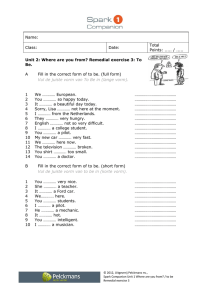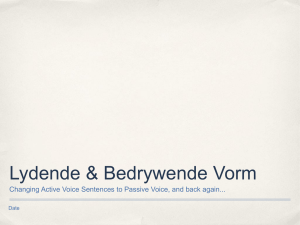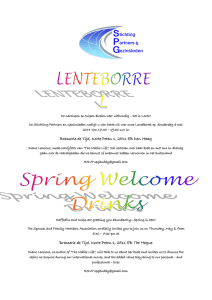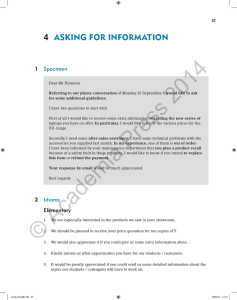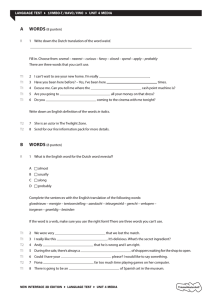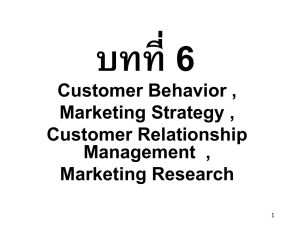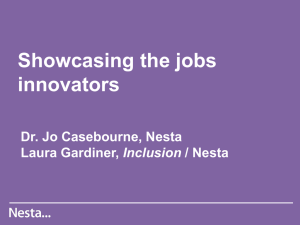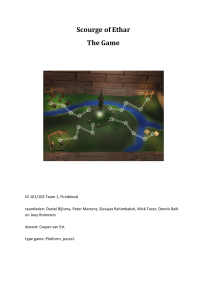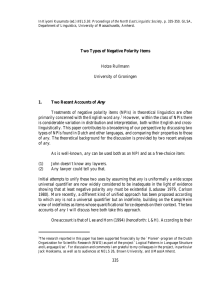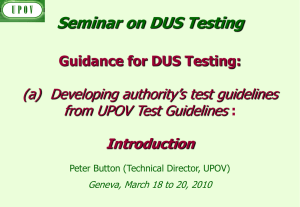1.3 The generation game
advertisement
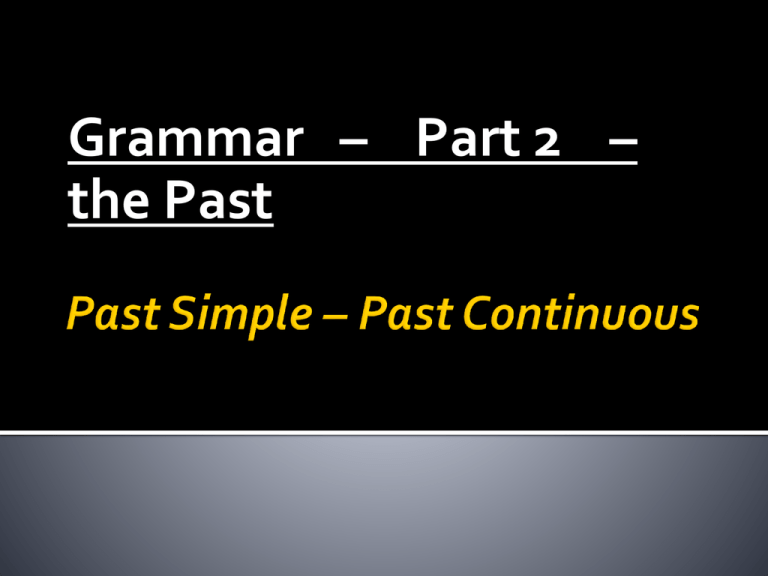
Grammar – Part 2 – the Past Recapitulation: Past Simple – Verleden tijd -> simpele vorm: I worked/he worked. Gebruik nooit een –s in de verleden tijd. Examples: ‘We went out for a drink last night’ Vorm: hele werkwoord + -ed bij regelmatige werkwoorden zoals [I play -> I played] maar bij onregelmatige werkwoorden eigen unieke vorm [I teach -> I taught] Echter, in vraagzinnen en ontkennende zinnen gebruik v/h hulpwerkwoord ‘did’. N.B. -> na hulpwerkwoord ‘did’ altijd het hele w.w. gebruiken! John wrote an e-mail yesterday Key Words Past Simple! Time references: - yesterday - last week, last year, last month, last Christmas, etc. - in 2004, in 1969, etc. - two weeks ago, 4 years ago, etc. - na: ‘when’ * Gebruik: - Als iets in het verleden plaatsvond en afgelopen is! - Wanneer aangegeven is WANNEER iets is gebeurd [yesterday, last week, see other keywords above] - wanneer de zin begint met ‘when’, bijna altijd Past Simple [“when I was young”, “when did you go home?”] Dus: N-E “hij heeft vorige week een brief geschreven” = “he wrote a letter last week”. Past Continuous – verleden tijd -> I was working/you were working *Examples: - ‘They were listening to a new song when I rang’ - ‘Look at this photo: the sun was shining that day!’ - ‘Were you doing your homework while I was chatting online?’ Vorm: Was/were+ hele w.w. + ing-vorm Bij vragende vorm en ontkennende vorm was/were + not + ing-vorm (omdat ‘to be’ al functioneert als een hulpwerkwoord en dus niet nog eens ‘do’ als hulpwerkwoord nodig heeft) 1. John was writing an e-mail while his father came home 2.John was writing an e-mail when his father came home 3.John was writing an e-mail as his father came home Keywords Past Continuous: -while -when [N.B. ‘when’ is dus ook een sleutelwoord v/d Past Continuous maar komt dan voor in een zin met de Past Continuous EN de Past Simple en wordt dan ook weer opgevolgd door de Past Simple [see example 2 above -> came] -as *Gebruik: - als iets in het verleden enige tijd voortduurde Examples: As I was crossing the street, I fell and broke my leg. What were you doing when the thieves came into your house? NOTA BENE! De zogenaamde ‘state verbs’, gezien in de Present Continuous worden ook niet in de Past Continuous gebruikt. -Je zegt dus niet: I was understanding en ook niet I was hating, etc 1. She said that she (drive) ........................... at 30 k.p.h. When the dog suddenly (cross) .............. the road. 2. When we arrived they (had) ................... lunch. They apologized for starting without us but said that they always (to have lunch) ................... at 12.30. 3. She said that she (hate) ............... her present job and (try) ............... to find another. 4. She (say) ............... that she (knit) .......... herself a jumper and that she (think) ............... it would be ready before Christmas. 5. It (snow) ..........and cars (slide) .............. all over the road. 6. While I (sunbathe) ................. someone (take) ...... my shoes and I (have to) ................... walk home on my bare feet. 7. They had turned the bike upside down and (mend) ............ the puncture. I asked how long it would take. 8. The killer (carry) ............ the body down the stairs when all of a sudden he (hear) .............. a key in the front door. 9. While the guests (eat) ..................., burglars (enter) .................... the house and (steal) ............... a lot of fur coats. 10. She (sit) ............ at the bus stop. I asked her which bus she (wait) .............. for. 11. The car was empty but the engine (run) ............... Key to answers: 1. was driving / crossed 2. were having / had lunch 3. hated / was trying 4. was knitting / thought 5. was snowing / were sliding 6. was sunbathing / took / I had to 7. were mending 8. was carrying / heard 9. were eating / entered / stole 10. was sitting / was waiting for 11. was running
